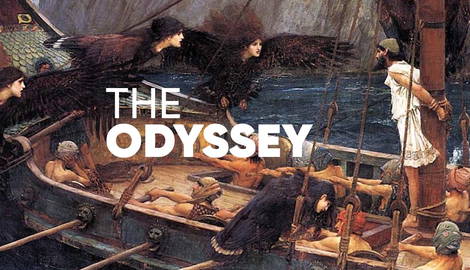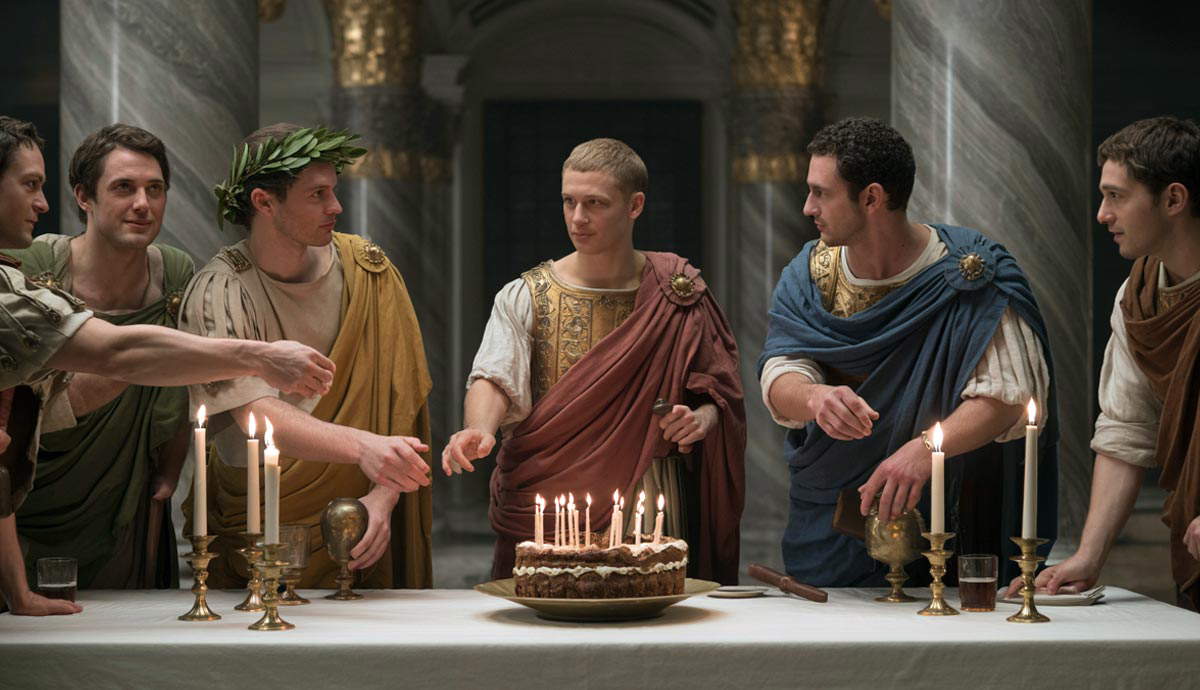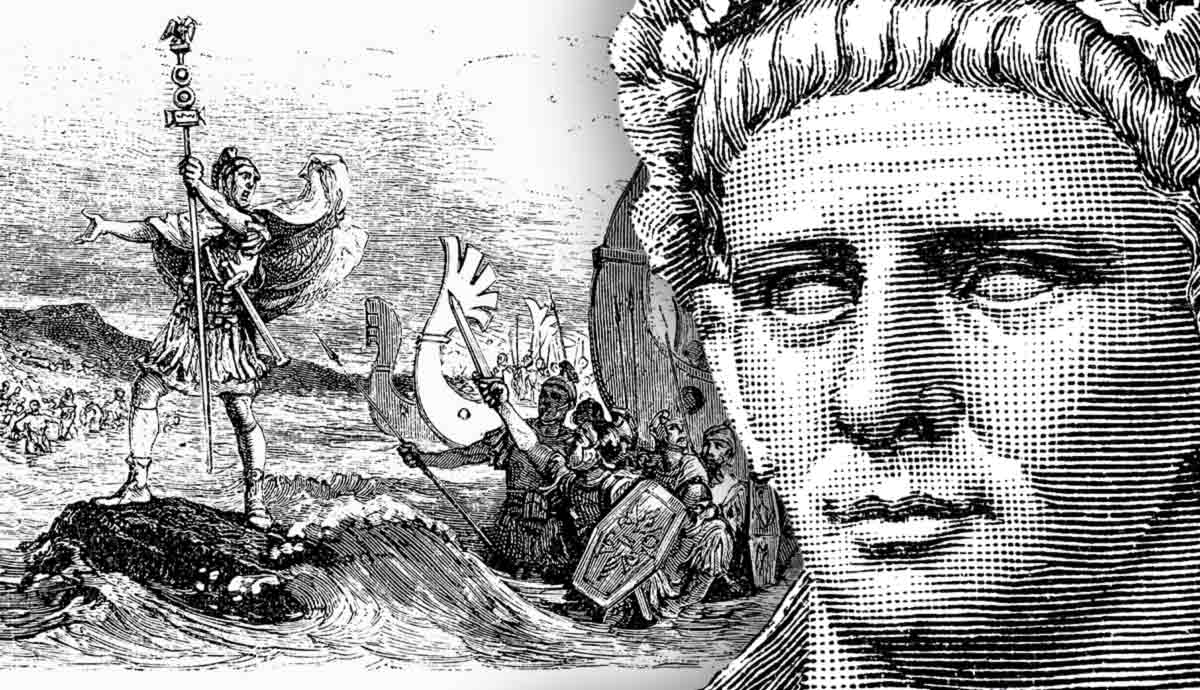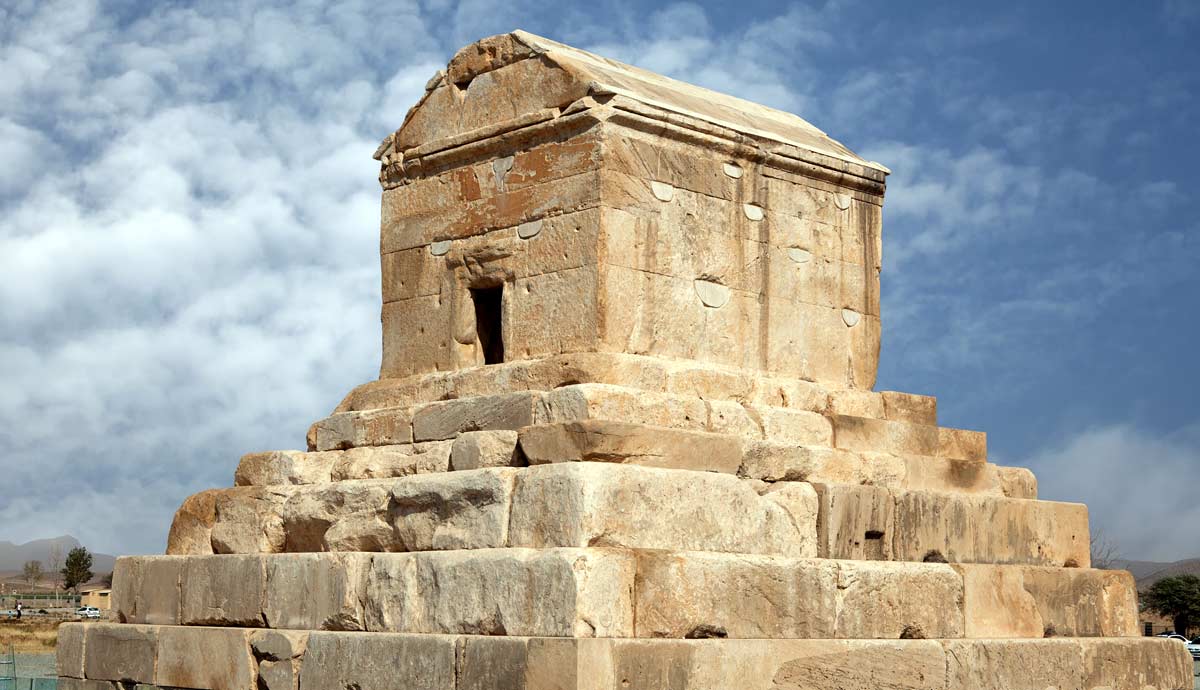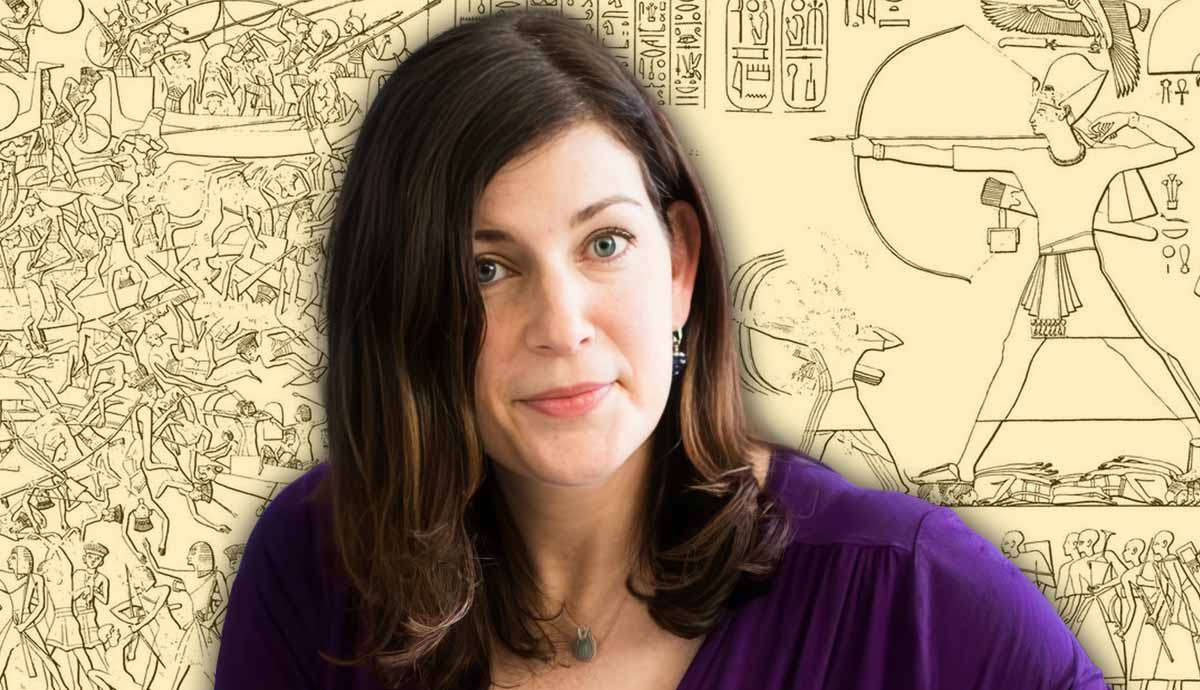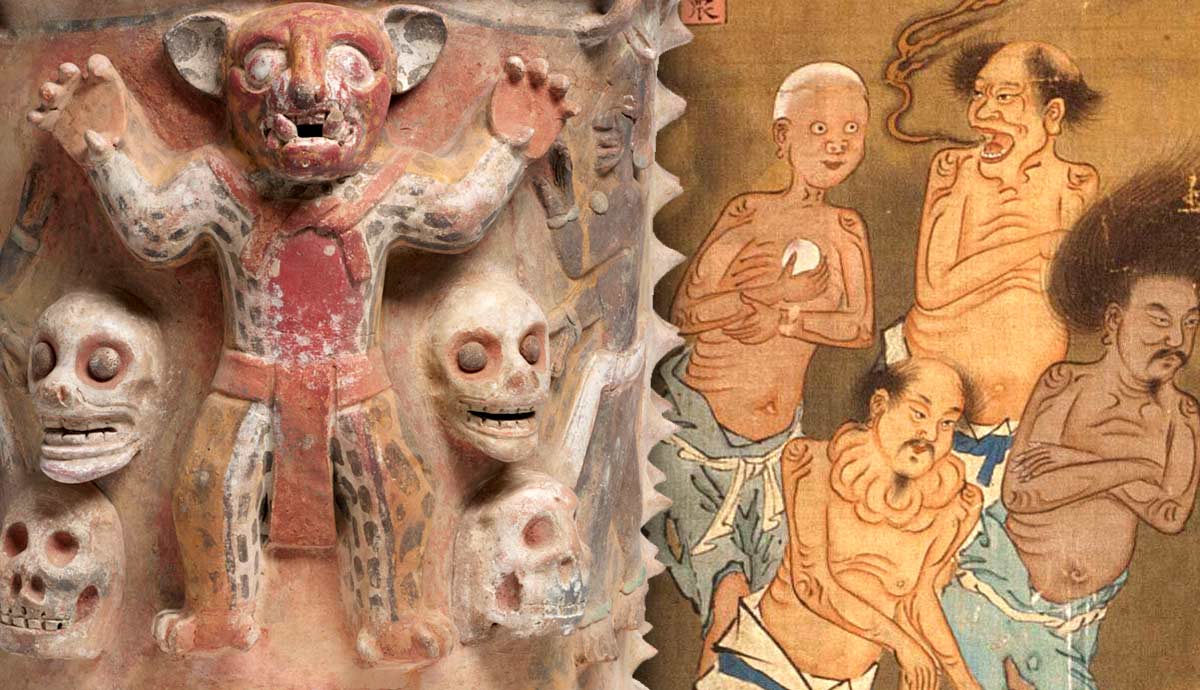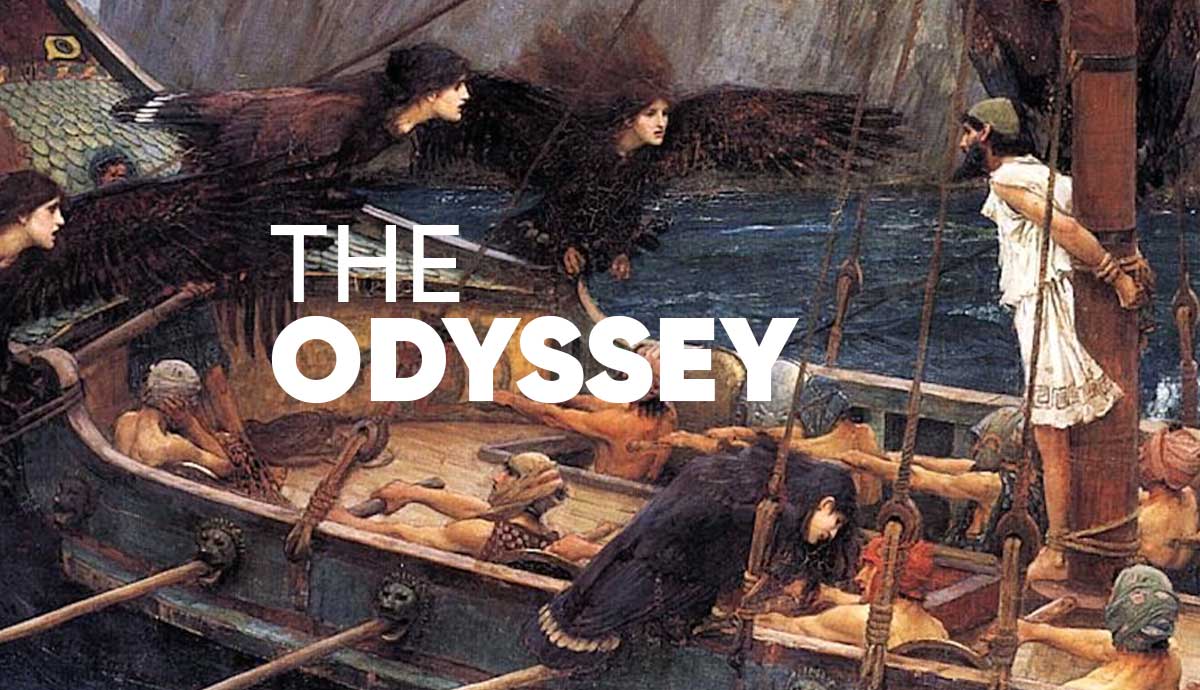
The Greek epic poem The Odyssey is attributed to Homer and is often described as the sequel to The Iliad. The Odyssey picks up after the fall of Troy and follows Odysseus (also Ulysses), the king of Ithaca, who fought on the side of the Greeks, as he journeys home. He is blown off course by the sea god Poseidon, who is angry with Odysseus. As a result, it takes Odysseus ten years and many adventures to reach home. When he arrives, all is not well, as he is presumed dead, so suitors are competing for the hand of his wife, Penelope, and his throne. The story is non-linear, and less than half of the epic relates to Odysseus’ journey home, with far more of the poem talking about events in Ithaca.
Let’s take a closer look at what happens in The Odyssey with a summary of its 24 books, called Rhapsodies.
Homer’s Odyssey Summary (Rhapsody by Rhapsody)
| Rhapsody | Summary |
| Book 1 | Odysseus is held captive by Calypso; Athena visits Telemachus and urges him to seek his father. |
| Book 2 | Telemachus addresses the suitors, prepares for his journey, and is helped by Athena. |
| Book 3 | Telemachus visits Nestor in Pylos, learns of Agamemnon’s fate, and continues to Sparta. |
| Book 4 | Telemachus visits Menelaus and Helen, hears about Odysseus, and the suitors plan an ambush. |
| Book 5 | Odysseus is released by Calypso, shipwrecked by Poseidon, and saved by Leucothea and Athena. |
| Book 6 | Nausicaa meets Odysseus by the river and helps him reach her parents’ palace. |
| Book 7 | Odysseus meets Queen Arete and tells of his escape from Calypso. |
| Book 8 | Odysseus participates in games and hears songs of Troy, revealing his emotional reaction. |
| Book 9 | Odysseus begins his tale: Cicones, Lotus-Eaters, and blinding Polyphemus the Cyclops. |
| Book 10 | Odysseus visits Aeolus, faces Laestrygonians, and is hosted by Circe for a year. |
| Book 11 | Odysseus visits the underworld, speaks with Teiresias, his mother, and dead heroes. |
| Book 12 | Odysseus sails past the Sirens, escapes Scylla and Charybdis, and loses his crew on Helios’s island. |
| Book 13 | Odysseus returns to Ithaca; Athena disguises him as a beggar. |
| Book 14 | Odysseus visits Eumaeus the swineherd and tells a false tale. |
| Book 15 | Telemachus returns from Sparta with a prophet; Athena warns him of danger. |
| Book 16 | Odysseus reveals himself to Telemachus, and they plan their revenge. |
| Book 17 | Odysseus enters the palace disguised as a beggar; Argos recognizes him. |
| Book 18 | Odysseus defeats Irus and warns suitor Amphinomos; Penelope demands gifts. |
| Book 19 | Penelope questions the beggar; Eurycleia recognizes Odysseus by his scar. |
| Book 20 | Odysseus and Penelope struggle with emotion; omens predict doom for the suitors. |
| Book 21 | Penelope sets the bow contest; Odysseus reveals himself to loyal servants. |
| Book 22 | Odysseus kills the suitors and punishes disloyal servants. |
| Book 23 | Penelope tests Odysseus’ identity; they reunite and recount their stories. |
| Book 24 | Odysseus visits Laertes; peace is brokered between Odysseus and the suitors’ families. |
Rhapsodies 1-4: Telemachus, the Suitors, and the Return of the Greeks
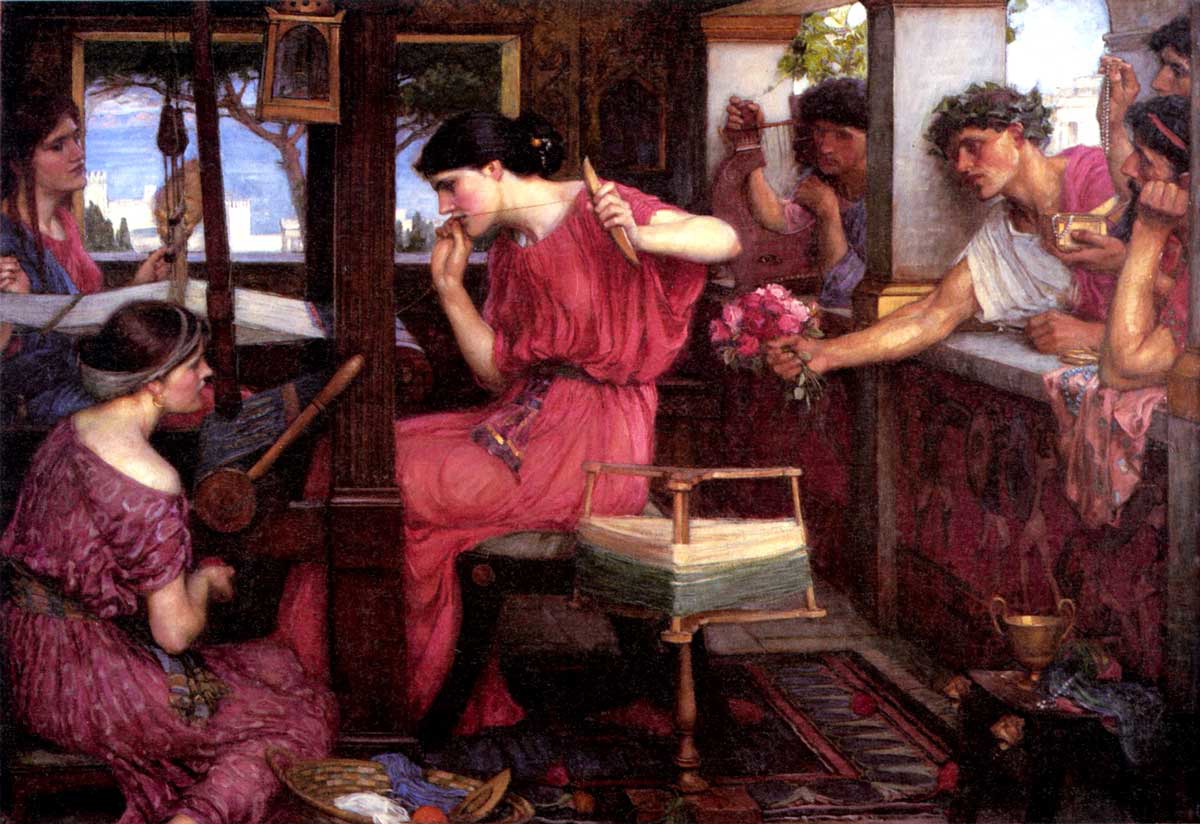
Rhapsody 1
The Odyssey begins seven years into Odysseus’ wanderings following the Trojan War, when he is a prisoner on the island of Calypso. Athena takes advantage of Poseidon’s absence to ask her father, Zeus, to let her favored Odysseus return home, and he agrees.
Athena then goes to Ithaca to visit Odysseus’ 20-year-old son, Telemachus. She sees that the palace is full of suitors for Queen Penelope, the wife of Odysseus, since he is presumed dead. Athena advises Telemachus to send the suitors away and go out in search of his father.
Rhapsody 2
There is a gathering in Ithaca during which Telemachus complains about the behavior of the suitors, whom he describes as disrespectful and greedy. The two main suitors, Antinous and Eurymachus, blame Penelope for not having chosen a suitor. She has been delaying, claiming that she must first weave the shroud of Odysseus, but she weaves every day and undoes her work each night so that she is never done.
Together, Telemachus and Athena procure a ship and prepare to set sail, with the goddess promising to accompany the youth.
Rhapsody 3
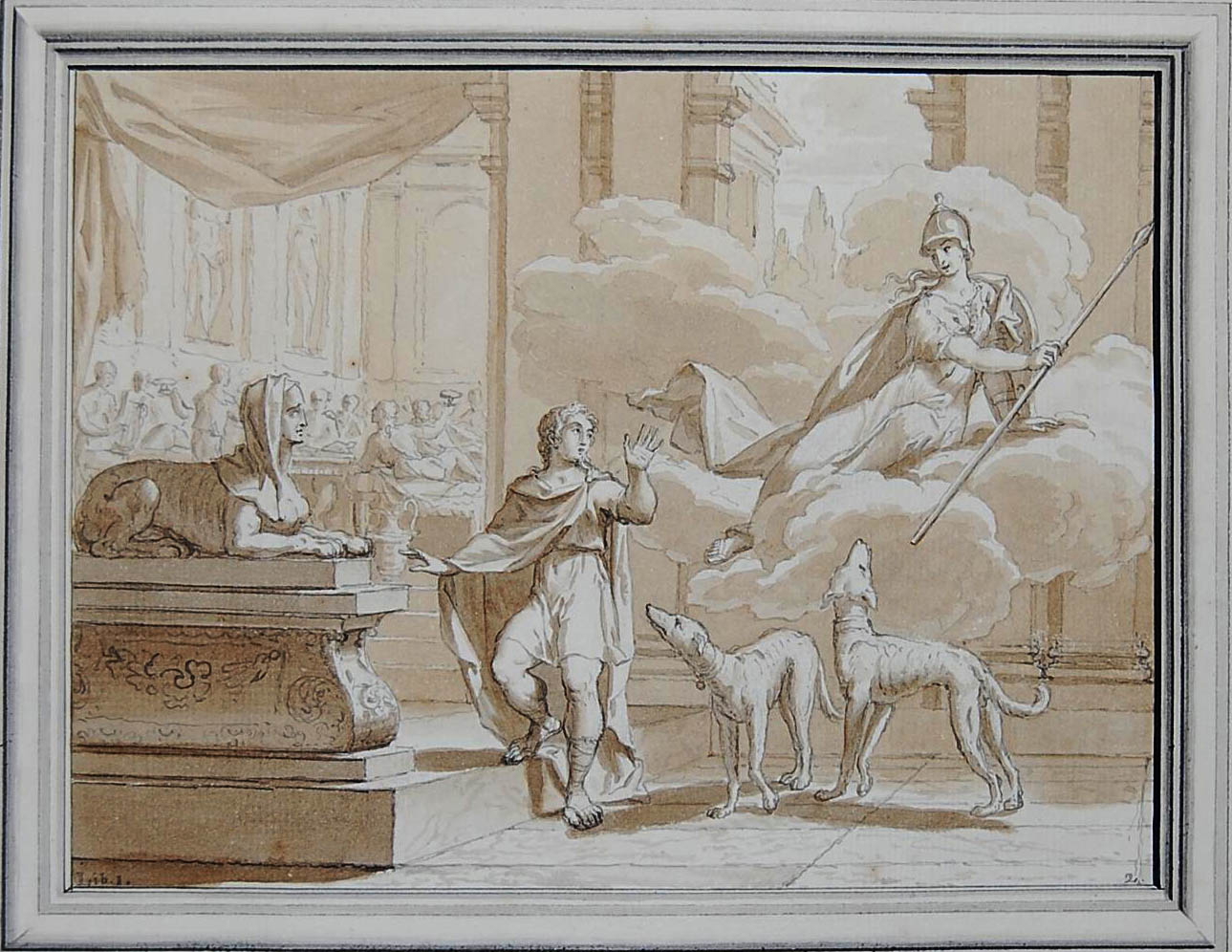
Telemachus’ first stop is Pylos, to visit King Nestor, a hero of the Trojan War, in search of information. Nestor recounts the final fall of Troy and the hands of the Greeks, and Telemachus describes the sad situation in Ithaca. Nestor also tells him the story of the murder of Agamemnon, who was killed by his wife Clytemnestra with the help of her lover Aegisthus when he returned from the war, in revenge for Agamemnon sacrificing their daughter Iphigenia.
Nestor tells Telemachus that he should go to Sparta and visit King Menelaus. Athena says that they should leave immediately, but Nestor convinces Telemachus to stay the night. Athena turns into a bird and leaves, and the next day, Nestor sends his son Peisistratus with Telemachus to Sparta.
Rhapsody 4
Telemachus and Peisistratus reach Sparta and are welcomed by Menelaus and his wife, Helen, now returned to him. They share stories about Odysseus. Helen tells a story of how Odysseus disguised himself as a beggar to sneak into Troy; she recognized him but remained silent, hoping for a Greek victory. Menelaus tells the story of the Trojan Horse and how it was Odysseus’ plan.
Telemachus asks for current news about Odysseus, prompting Menelaus to tell the story of his own homecoming, including how he stopped in Egypt and heard from Proteus about the homecomings of the other Greek leaders.
Meanwhile, back in Ithaca, the suitors have learned of Telemachus’ departure and prepare an ambush for him upon his return.
Rhapsodies 5-8: Odysseus Meets the Phaeacians

Rhapsody 5
The action now moves from Telemachus to his father Odysseus, who is being held prisoner on the island of the nymph Calypso. Zeus sends Hermes, the messenger of the gods, to tell Calypso to let Odysseus go home. She does so reluctantly, and Odysseus builds a boat for the next stage of his journey.
When Poseidon sees Odysseus on the water, he sends a great storm that wrecks his boat, but the goddess Leucothea gives him her headdress as a life-buoy and Athena calms the storm. He ends up swimming up the mouth of a river to make a safe landfall.
Rhapsody 6
The next day, Athena appears in a dream to Nausicaa, the princess of the nearby Phaeacian kingdom. This inspires her to go to the river to wash her clothes with her maidens, where they are surprised by the appearance of Odysseus. He begs them for help. Nausicaa gives him clothes and advises him to make his way to the city alone to consult with her father.
Rhapsody 7

Odysseus makes his way to the house of King Alcinous, where he implores Queen Arete for help. He is given a place at their table and, without identifying himself, Odysseus tells them the story of his escape from the island of Calypso and his arrival there. The king promises to help him make his way home, but also offers Odysseus his daughter’s hand in marriage if he chooses to stay.
Rhapsody 8
There is a feast the following day during which the singer Demodocus sings about the athletic contests held at Troy, in which Achilles and Odysseus excelled. Alcinous’ son, Laodamas, invites Odysseus to participate in an athletic competition. When he is rudely challenged by another Phaeacian, Euryalos, Odysseus demonstrates his prowess with the discus.
Next, Demodocus sings of the adulterous love affair of Ares and Aphrodite, and how they were caught by her husband, Hephaestus. He also sings about the Trojan Horse, bringing Odysseus to tears. This prompts the party to ask Odysseus to identify himself.
Rhapsodies 9-12: Odysseus Recounts His Journey

Rhapsody 9
Odysseus reveals his true identity and offers a fuller account of his journey following the Trojan War. He describes that, upon leaving Troy, he and his men sacked the Thracian town of Ismarus, killing most of the men and taking the women as slaves. But the men lingered, drinking and reveling, and reinforcement arrived. They killed so many of Odysseus’ men that they were forced to flee.
Their ships carried them to the land of the Lotus-Eaters, where the food made the men forget their homes. But Odysseus did not eat and was able to drag his men back to their ships and tie them to their rowing benches.
Next, they reached the land of the Cyclopes, one of whom, Polyphemus, held them captive and even ate six of Odysseus’ men. Therefore, Odysseus got him drunk and blinded him so that they could escape. Later, Odysseus boasted of his act, causing Polyphemus to pray to his father Poseidon for revenge, which started Poseidon’s torment of Odysseus.
Rhapsody 10

Next, Odysseus reaches the land of King Aiolus, whom the gods had given control of the wind. He gives Odysseus a bag of wind to help him on his journey home. But his men think that it is treasure, and as they near Ithaca, they open the bag, which blows them back to the island of Aiolus, who refuses to offer further help.
They next reach the land of the Laestrygonian giants, who savagely attack and destroy all but one of Odysseus’ ships. That remaining ship landed on the island of the witch Circe, who turns Odysseus’ men into pigs. Odysseus escapes the same fate thanks to a charm given to him by Hermes, and he convinces Circe to restore his men. They then stay as guests on her island for a year. As they prepare to leave, Circe tells Odysseus that he must visit the underworld and consult with the prophetess Teiresias.
Rhapsody 11

To reach the underworld, Odysseus sails to the edge of the world and performs a ritual to summon the souls of the dead. Teiresias tells Odysseus about his homecoming, warns him not to touch the herds of the sun god Helios, and tells him that he must make one last journey before returning home. While in the underworld, Odysseus also spoke to his mother, Anticleia, and other noblewomen. This gives him a chance to pause his story and praise his host, Queen Arete.
Alcinous urges him to continue his story, and Odysseus recounts his conversations with the shades of Greek heroes, including Agamemnon, Achilles, Ajax, Minos, Orion, Tantalus, Sisyphus, and Heracles.
Rhapsody 12

Odysseus and his men then stopped at Circe’s Island again before sailing past the Sirens with Odysseus tied to the mast so that he was not tempted by their song. They passed the perilous whirlpool Charybdis and the monster Scylla, who ate another six of Odysseus’ men.
They finally landed on Thrinacia, the island of Helios, where they stayed for over a month due to storms. Despite Odysseus’ warning his men not to slaughter any of the sun god’s cattle, they did so when Odysseus was asleep. Zeus punished them by sending a sea storm, and only Odysseus was spared, who went on to land on the island of Calypso.
Rhapsodies 13-16: Odysseus and Telemachus Return to Ithaca

Rhapsody 13
A Phaeacian ship takes Odysseus to Ithaca, where he is left sleeping at the harbor of Phorcys. Meanwhile, Poseidon is angry that the Phaeacians helped Odysseus and turns their returning ship to stone. When Odysseus awakens, he does not recognize his homeland, and when he meets a shepherd who tells him where he is, he lies and says that he is a Cretan fugitive. The shepherd reveals himself to be Athena in disguise.
Convinced he is home, Odysseus gives thanks to the nymphs and hides his treasure. He then receives advice from Athena on what he should do. She also changes his likeness to that of a beggar, and then she goes off to find Telemachus.
Rhapsody 14
Odysseus goes to the home of a loyal swineherd called Eumaeus, but still does not reveal his identity, claiming to be a Cretan warrior who fought at Troy, and then traveled to Egypt, before traveling with Phoenician traders, which led him to Ithaca. The swineherd is disbelieving but still welcoming, and shares news of what is happening at the palace.
Rhapsody 15

Athena finds Telemachus in Sparta and urges him to return home, also warning him about the waiting ambush. Telemachus and Peisistratus leave, first to take Peisistratus back to Pylos, where Telemachus takes on board a fugitive prophet called Theoclymenus. He interprets favorable omens when they arrive in Ithaca.
Rhapsody 16
Telemachus arrives at the house of Eumaeus and orders him to the palace to tell Penelope of his return. Odysseus reveals himself to his son, and the two start to plot how to deal with the suitors. When the news reaches the palace of Telemachus’ return, the suitors again start to plot against him.
Rhapsodies 17-23: Odysseus Versus the Suitors

Rhapsody 17
Telemachus returns to the palace and tells Penelope about his journey, and the prophet Theoclymenus predicts Odysseus’ imminent return. Odysseus also arrives at the palace disguised as a beggar, but he is recognized by his dog Argos. Odysseus begs from the suitors and tells false stories of his adventures. Antinous leads the suitors in abusing Odysseus, and he is also mistreated by some of the palace staff.
Eumaeus tells Penelope about the stranger and his incredible story, and she is keen to meet him. But just as Odysseus is about to be summoned, which would give away his identity, Telemachus sneezes loudly, and the meeting is deferred.
Rhapsody 18
Odysseus is challenged by another beggar, Irus, whom he beats in a boxing match. He then warns one of the suitors, Amphinomos, about their reckless behavior and abuse of the hospitality of the palace. Penelope also complains about the behavior of the suitors, saying that they eat her stores rather than bring her gifts, prompting many to present her with gifts.
Rhapsody 19
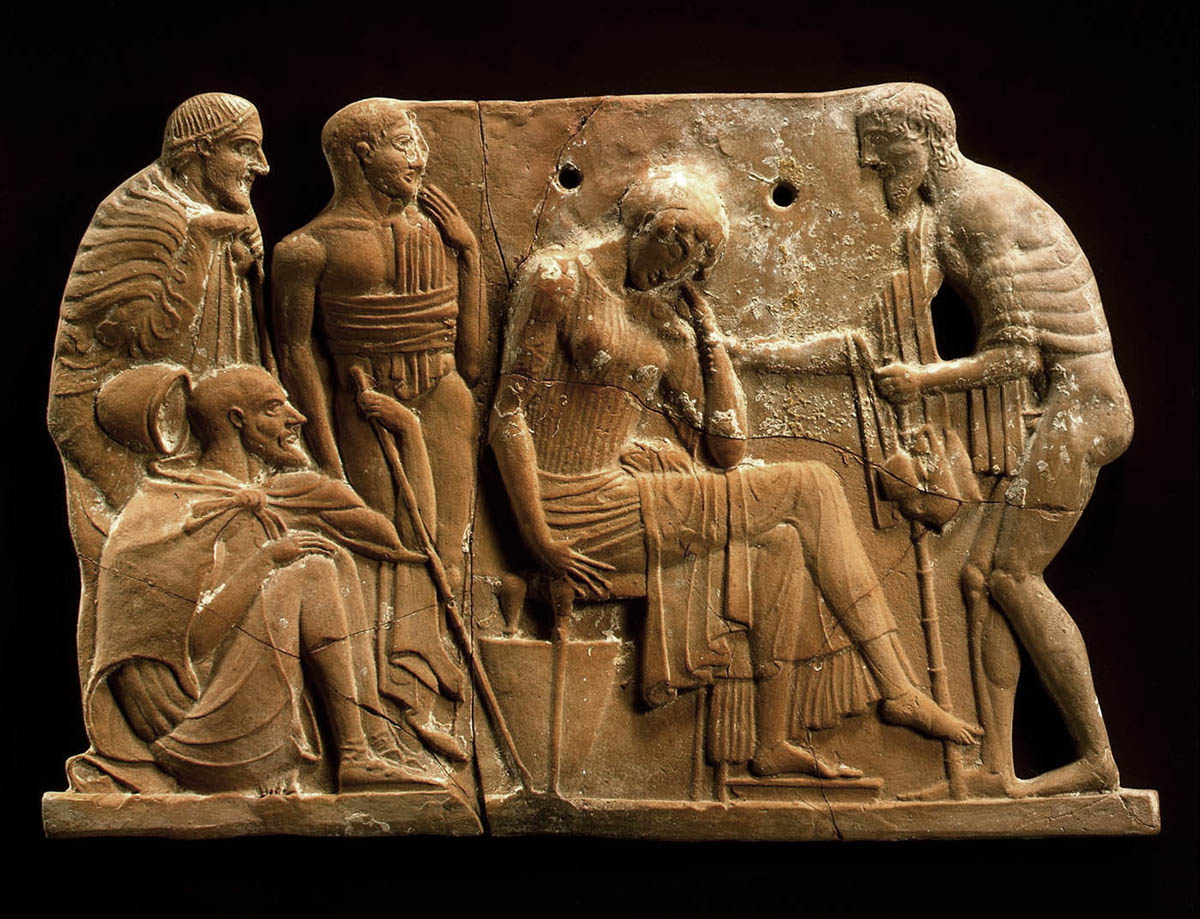
That night, Odysseus and Telemachus remove all the weapons from the hall with the help of Athena. Penelope finally meets the beggar, who still claims to be a Cretan, but also claims that he once entertained Odysseus on his voyage to Troy. He surprises Penelope by describing her husband perfectly. He also declares that Odysseus is safe and will arrive soon.
Penelope wants the beggar washed and given fresh clothes, so the old nurse Eurycleia washes his feet. She recognizes a scar on his foot and almost gives away his true identity.
Penelope confides the details of a dream she had to the beggar, who interprets it favorably. Still, Penelope plans to put an end to the constant courting of the suitors by planning a competition with Odysseus’ own bow, and marrying the winner.
Rhapsody 20
Both Odysseus and Penelope pass a rough night, thinking of one another, but Athena appears to Odysseus to renew his hope. The next day, the banquet hall is made ready for the feast of the new moon. Odysseus pronounces a prophecy of his own return, and omens prevent the suitors from killing Telemachus. Theoclymenus pronounces a prophecy that dooms the suitors, and they expel him from the hall.
Rhapsody 21

Ready for her competition, Penelope brings out Odysseus’ bow and challenges the suitors to string and shoot the heavy bow. None of the suitors can even string it. Odysseus reveals himself to two servants who proved themselves loyal and enlists their help.
Odysseus then begs to try the bow and is rebuked by the suitors. Penelope interjects that her guest should be allowed to have his turn, and this is planned for the following day. Early in the morning, Odysseus’ allies ensure that all the women stay in their rooms, and once the suitors are in the hall, the doors are closed. Odysseus then deftly handles the bow, stringing and shooting it with exact accuracy, surprising the suitors. Zeus gives his approval with a thunderclap, and Telemachus takes his position at his father’s side.
Rhapsody 22
Odysseus shoots Antinous and reveals himself to the suitors. While some try to make terms, they are all killed one after another. House servants who had been disloyal and unkind to Odysseus when they thought he was a beggar are also killed. Athena appears and protects Odysseus from the counterattacks of the suitors. The disloyal women are summoned and made to clean up the corpses as punishment, and twelve of them are also hanged in the courtyard.
Rhapsody 23
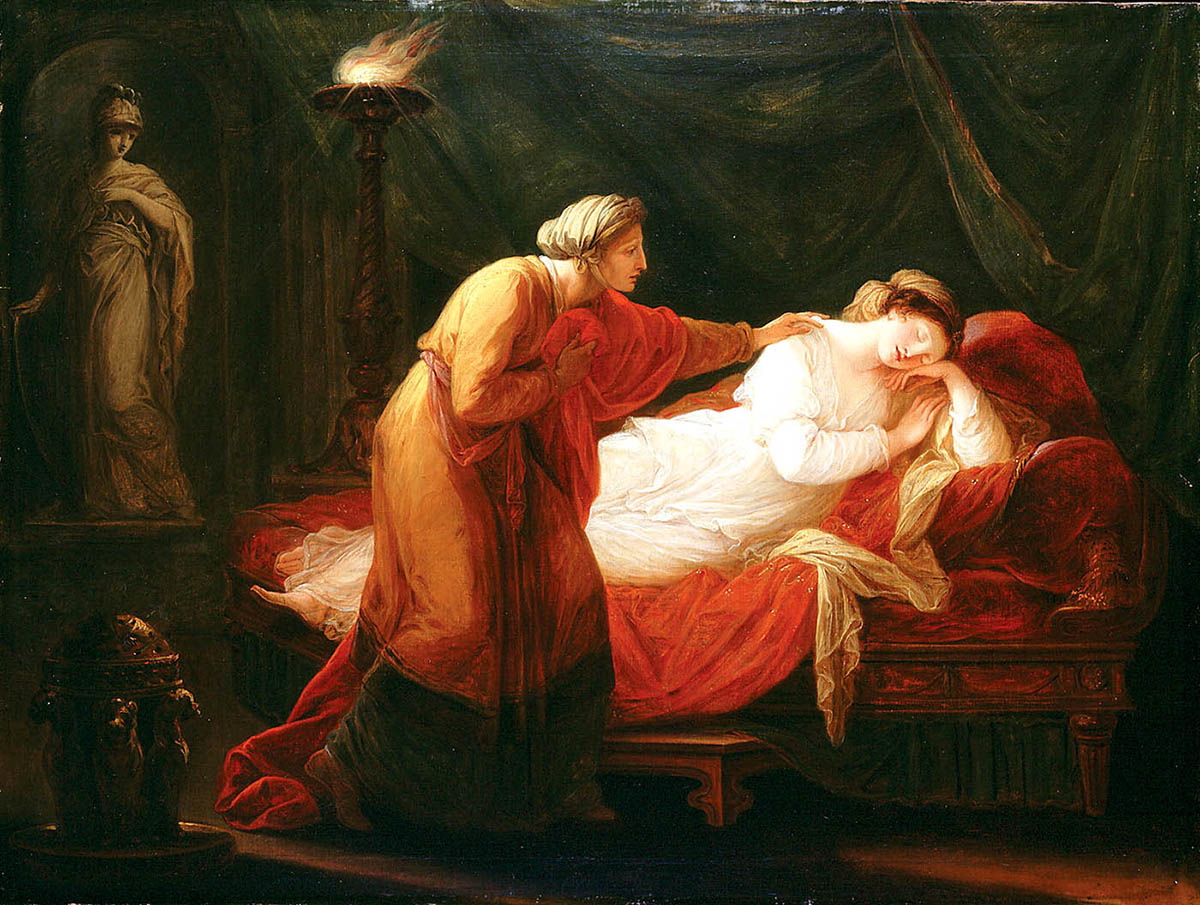
Penelope and the other loyal women are summoned to the hall, but when Penelope hears the news that Odysseus is back and has killed the suitors, she is initially skeptical. While both Telemachus and Odysseus rebuke her slowness of recognition and coldness, she eventually tests Odysseus with stories about their bedchamber, and she finally recognizes him through his answers. They then spend the evening exchanging stories of the last ten years.
The very next morning, Odysseus leaves his wife and goes to find his father, Laertes, who has lived in voluntary exile as a farmer since Odysseus left for Troy.
Rhapsody 24: Epilogue

Hermes leads the shades of the dead suitors to the underworld, where Agamemnon and Achilles talk about their own deaths and funerals. Meanwhile, Odysseus finds his father on his farm, proving his identity by reciting the names of all the plants his father had given him over the years. Laertes returns to the palace with Odysseus and is imbued with new strength by Athena. Together, they plan to fight the families of the suitors, who are seeking revenge. When the first person is killed, Athena intervenes and brokers a peace between the two sides.
What Happens After the Odyssey? The Story of the Telegony

This is not the end of the story, which continues in a lesser-known work called The Telegony. This starts with the burial of the suitors, and then Odysseus going to Thesprotia to make sacrifices that were commanded by the shade Tiresias. There he weds their queen, Callidice, and has a son, Polypoetes. He then fights there against the neighboring Brygoi, against Ares, and with the support of Athena. Later, Callidice dies, so he makes his son king and returns to Ithaca.
Meanwhile, we learn that he also had a son with Circe called Telegonus. When he accidentally finds himself in Ithaca one day, he commits piracy to survive and steals Odysseus’ cattle. When Odysseus comes to defend his property, Telegonus kills him with a poison spear given to him by Hephaestus. It is only as Odysseus lies dying that the two recognize each other.
A regretful Telegonus takes Odysseus’ body home to Penelope, and together with Telemachus, then takes Odysseus’ body back to Circe’s island to be buried. Circe makes the two boys immortal, and Telemachus marries Circe, and Telegonus marries Penelope.
